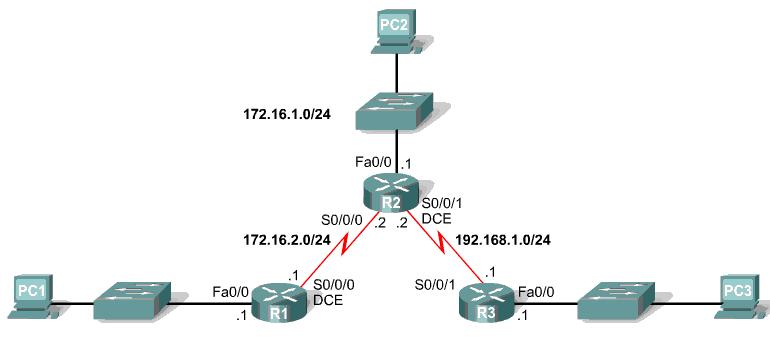Принципы маршрутизации из курса CISCO. Статическая маршрутизация.
Статическая маршрутизация и переадресация пакетов:

Данный пример иллюстрирует переадресацию пакетов при статической маршрутизации. PC1 отправляет пакет PC3:
Остальное без перевода, чтобы не путать.
1. The packet arrives on the FastEthernet 0/0 interface of R1.
2. R1 does not have a specific route to the destination network, 192.168.2.0/24; therefore, R1 uses the default static route.
3. R1 encapsulates the packet in a new frame. Because the link to R2 is a point-to-point link, R1 adds an "all 1s" address for the Layer 2 destination address.
4. The frame is forwarded out the serial 0/0/0 interface. The packet arrives on the Serial 0/0/0 interface on R2.
5. R2 decapsulates the frame and looks for a route to the destination. R2 has a static route to 192.168.2.0/24 out Serial0/0/1.
6. R2 encapsulates the packet in a new frame. Because the link to R3 is a point-to-point link, R2 adds an "all 1s" address for the Layer 2 destination address.
7. The frame is forwarded out the Serial0/0/1 interface. The packet arrives on the Serial0/0/1 interface on R3.
8. R3 decapsulates the frame and looks for a route to the destination. R3 has a connected route to 192.168.2.0/24 out FastEthernet 0/1.
9. R3 looks up the ARP table entry for 192.168.2.10 to find the Layer 2 MAC address for PC3.
a. If no entry exists, R3 sends an ARP request out FastEthernet 0/0.b. PC3 responds with an ARP reply which includes the PC3 MAC address.
10. R3 encapsulates the packet in a new frame with the MAC address of interface FastEthernet 0/0 as the source Layer 2 address and the MAC address of PC3 as the destination MAC address.
11. The frame is forwarded out the FastEthernet 0/0 interface. The packet arrives on the NIC interface of PC3.
Размещено в разделе Cisco
06.11.2009
Комментарии:
Нет записей, оставьте свой комментарий.